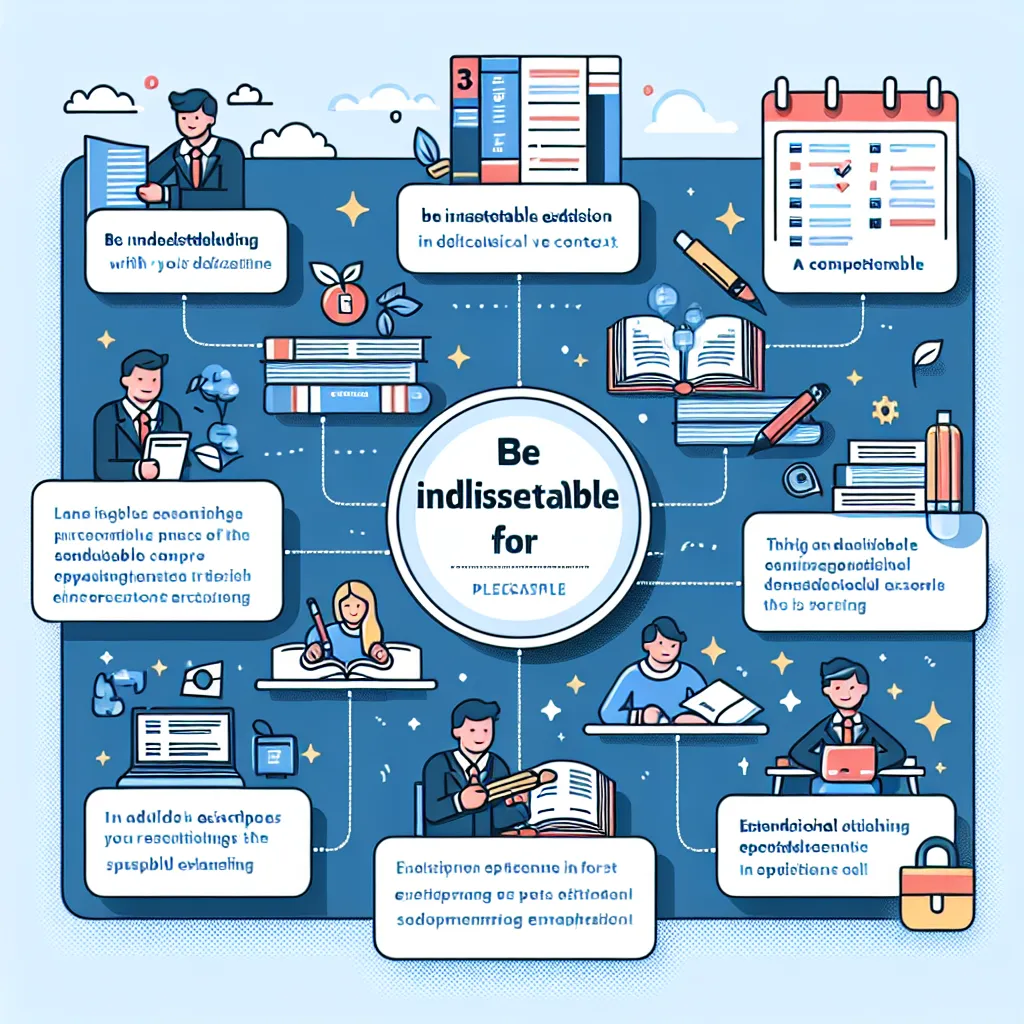The phrase “be indispensable for + noun/gerund” is a powerful structure that can significantly enhance your IELTS performance. This expression is particularly useful in Task 2 essays and Speaking Part 3, where you need to discuss the importance of various factors or elements. Let’s delve into its meaning, usage, and how to effectively incorporate it into your IELTS responses.
Nội dung bài viết
Understanding the Meaning and Usage
The phrase “be indispensable for” means to be absolutely necessary or essential for something. It emphasizes the critical nature of a particular element in relation to a specific purpose or outcome. This structure is commonly used in academic and professional contexts, making it highly relevant for IELTS.
Examples:
- Technology is indispensable for modern education.
- Effective communication skills are indispensable for success in the workplace.
- Regular exercise is indispensable for maintaining good health.
- A diverse skill set is indispensable for adapting to the changing job market.
- Critical thinking is indispensable for solving complex problems.
In each of these examples, the element before “is indispensable for” is presented as crucial and irreplaceable for the purpose or area mentioned after.

Grammatical Structure and Variations
The basic structure is:
[Subject] + [be verb] + indispensable + for + [noun/gerund]
It’s important to note that you can use different forms of the verb “to be” depending on the subject and tense:
- is/are indispensable for (present tense)
- was/were indispensable for (past tense)
- will be indispensable for (future tense)
- has been/have been indispensable for (present perfect)
You can also use this structure with other similar adjectives, such as:
- be crucial for
- be essential for
- be vital for
These variations can help you avoid repetition and demonstrate a wider vocabulary range, which is crucial for achieving a higher band score in IELTS. For more information on these alternatives, you can check out our articles on be crucial for + noun/gerund, be essential for + noun/gerund, and be vital for + noun/gerund.
Applying the Structure in IELTS Writing
Task 2 Essay
In IELTS Writing Task 2, using “be indispensable for” can help you express strong opinions and support your arguments effectively. Here’s an example of how you might use it in an essay about education:
“In today’s rapidly evolving world, technological literacy is indispensable for students’ future success. While traditional subjects remain important, the ability to navigate and utilize digital tools is indispensable for participating in the modern workforce. Moreover, critical thinking skills are indispensable for interpreting the vast amount of information available online. Therefore, schools must prioritize these areas to prepare students adequately for their future careers.”
This paragraph demonstrates how you can use the structure multiple times within a coherent argument, each time emphasizing a different crucial aspect of education.
Task 1 Report
While less common in Task 1, you can still use this structure to highlight key information in your data analysis:
“The graph clearly shows that internet access is indispensable for economic growth in developing countries. Over the 10-year period, countries with higher internet penetration rates consistently demonstrated stronger GDP growth, indicating that digital connectivity is indispensable for fostering economic development.”
Enhancing Your IELTS Speaking Responses
In the IELTS Speaking test, particularly in Part 3 where you discuss more abstract ideas, using “be indispensable for” can help you articulate your thoughts more precisely and impressively.
Example response to “What skills do you think are important for success in the modern workplace?”:
“I believe that adaptability is indispensable for thriving in today’s dynamic work environment. With technology evolving rapidly, the ability to learn new skills quickly is indispensable for staying relevant in any industry. Additionally, strong interpersonal skills are indispensable for effective teamwork and leadership, which are highly valued by employers. Lastly, I’d say that resilience is indispensable for overcoming challenges and maintaining productivity under pressure.”
This response effectively uses the structure multiple times, demonstrating a high level of language proficiency and thoughtful analysis of the topic.
Common Mistakes to Avoid
-
Incorrect preposition: Remember, it’s always “indispensable for,” not “to” or “of.”
Incorrect:Technology is indispensable to modern education.
Correct: Technology is indispensable for modern education. -
Overuse: While it’s a powerful phrase, using it too frequently can make your writing or speaking sound repetitive. Aim to use it 1-2 times in an essay or speaking response, complementing it with synonymous expressions.
-
Inappropriate context: Ensure that you’re using the phrase for truly essential elements, not just important ones.
Inappropriate:Coffee is indispensable for starting my day.(Unless you’re specifically emphasizing its absolute necessity)
Better: A nutritious breakfast is indispensable for maintaining energy throughout the day. -
Forgetting the gerund: When using a verb after “for,” remember to use the gerund (-ing) form.
Incorrect:Clean water is indispensable for survive in harsh conditions.
Correct: Clean water is indispensable for surviving in harsh conditions. -
Incorrect subject-verb agreement: Make sure the verb “be” agrees with your subject.
Incorrect:Communication skills is indispensable for teamwork.
Correct: Communication skills are indispensable for teamwork.
Conclusion
Mastering the use of “be indispensable for + noun/gerund” can significantly enhance your IELTS performance, particularly in Writing Task 2 and Speaking Part 3. It allows you to express the critical importance of various factors clearly and emphatically. Remember to use it judiciously, varying it with synonymous expressions to demonstrate a rich vocabulary. Practice incorporating this structure into your responses on topics like education, technology, workplace skills, and societal issues to become more confident in its use. By doing so, you’ll be well-equipped to articulate complex ideas and support your arguments effectively in the IELTS exam.
For further practice, try using this structure in sample essays or speaking responses on topics such as environmental protection, healthcare improvements, or the role of social media in modern society. The more you practice, the more natural and impactful your use of this phrase will become in your IELTS performance.